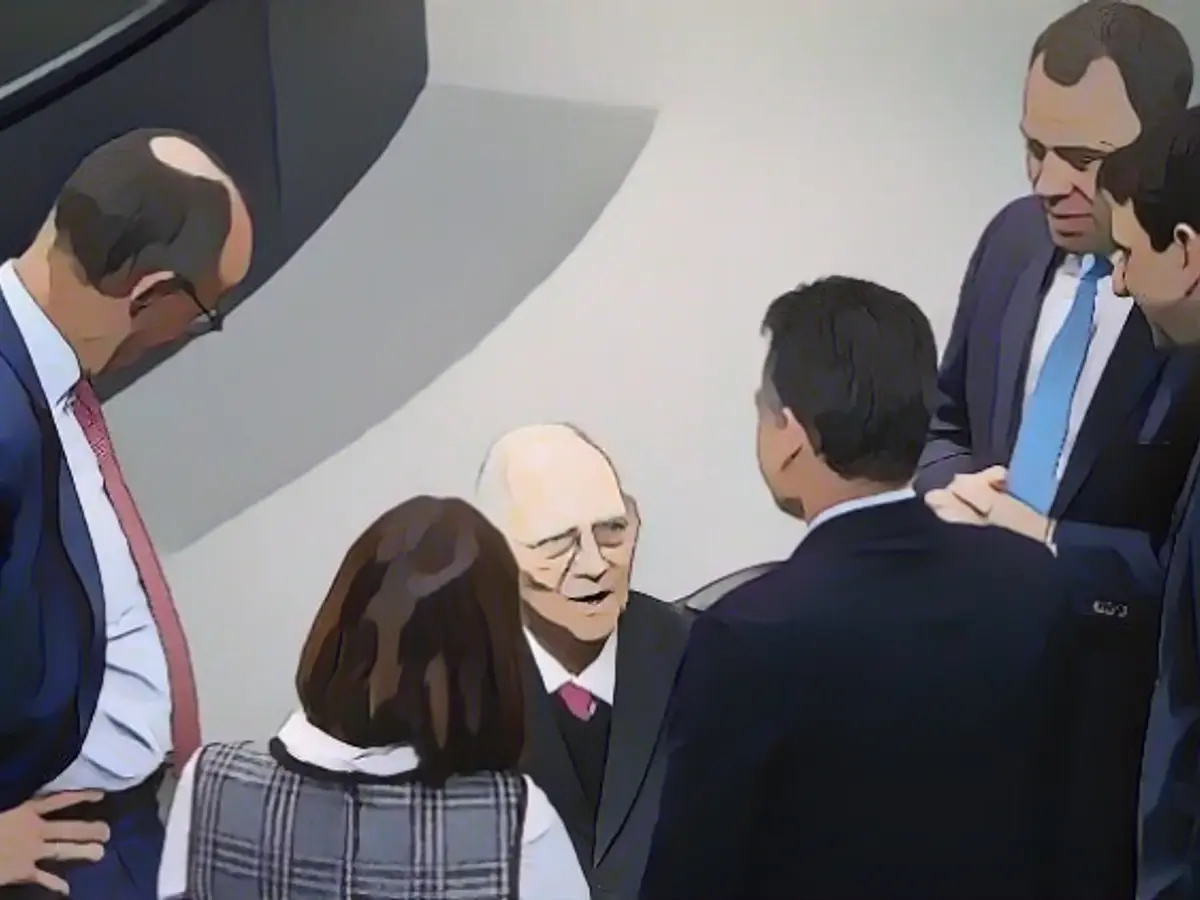"Great statesman" and "outstanding parliamentarian"
The death of Wolfgang Schäuble is causing deep sadness and sympathy in German politics. Companions and friends pay tribute to him as an important politician and advisor. He had shaped the country for more than half a century. Germany owes him a great deal.
CDU leader Friedrich Merz reacted with dismay to the death of Wolfgang Schäuble. The news "fills me with great sadness", he wrote in the online service X. "In Wolfgang Schäuble, I have lost the closest friend and advisor I have ever had in politics." His thoughts are with his family, especially his wife Ingeborg. Schäuble died yesterday evening, according to his family. He was 81 years old. CSU leader MarkusSöder announced that Schäuble had "rendered great services to Germany". The party will honor his memory.
"Wolfgang Schäuble has shaped our country for more than half a century: as a member of parliament, minister and president of the Bundestag," explained Federal Chancellor Olaf Scholz on X, the former Twitter. "With him, Germany is losing a sharp thinker, passionate politician and pugnacious democrat." Chancellery Minister Wolfgang Schmidt described Schäuble as an exceptional politician and a clever mind. "Conversations with him were a real pleasure. Germany has a lot to thank him for."
In a letter to the CDU/CSU parliamentary group, Merz wrote: "In Wolfgang Schäuble, we are losing an outstanding parliamentarian who represented his constituency of Offenburg in the German Bundestag for more than 51 years. As Federal Minister of the Interior and Federal Minister of Finance, Wolfgang Schäuble held high offices of state for many years," the letter to the MPs, which was made available to ntv, continues. "As President of the Bundestag, he represented our parliament both internally and externally in a prudent and demanding manner. In Wolfgang Schäuble, our country has lost a personality who shaped German and European politics for decades."
Federal Minister of the Interior Nancy Faeser paid tribute to Schäuble as a great statesman. "He embodied post-war democratic Germany like few others," she explained. As the Federal Minister of the Interior at the time, he was an architect of German unity who negotiated the Unification Treaty and signed it in August 1990. His word carried great weight."
Federal Economics Minister Robert Habeck paid tribute to Schäuble's fight to preserve parliamentary democracy. His experience made him an institution, Habeck said on Instagram. "Wolfgang Schäuble was always about a substantive core. I admired how he summoned up all his strength after the assassination attempt and lived his life full of courage and energy. What was special was that he always remained curious, was able to evaluate his own positions in the light of the present and sought to classify new things. That always impressed me," Habeck wrote. "In recent years, he became the memory and conscience of the conservatives and his party and a passionate fighter for the preservation of our parliamentary democracy."
Former Health Minister Jens Spahn wrote that Europe was losing a great statesman. "I am losing my most important mentor and a fatherly friend." CDU Federal Treasurer Julia Klöckner said that his death gave pause for thought and made her sad. "Wolfgang Schäuble was an exceptional person, an impressive thinker and speaker, a loyal and critical colleague. He shaped our country as a minister, as President of the Bundestag, as a politician who conscientiously fulfilled his duty and service."
Katrin Göring-Eckardt, Vice-President of the Bundestag, praised Schäuble as an opinionated and reliable person. She "appreciated his strength in argument, his contentiousness, not always his insistence, but always his openness to remain in conversation, at a high level and challenging." His political legacy "remains a mission for all political leaders: never to take parliamentary democracy for granted", she wrote at X.
Saxony's Minister President MichaelKretschmer wrote that no one had "shaped the Federal Republic of Germany with his political expertise and acumen for as long as Wolfgang Schäuble. He was the architect of German unity & led the country safely through a serious financial crisis. We have lost one of our country's greatest servants."
The Central Council of Jews paid tribute to Schäuble as someone who had put his life at the service of the country. He was a close friend of the Jewish community in Germany, it also said at X.
Schäuble was born on September 18, 1942 in Freiburg during the Second World War, studied law and economics and had been a member of the German Bundestag without interruption since 1972. Under Prime Minister Helmut Kohl, he was head of the Federal Chancellery before becoming Federal Minister of the Interior from 1989 to 1991. Schäuble was a member of the CDU Federal Executive Committee from 1989 to 2021 and party leader from 1998 to 2000 until he was replaced by Angela Merkel. In 2005, Schäuble once again became Minister of the Interior before taking over the federal finance portfolio in 2009 until 2017, where he had to steer Germany through the financial and euro debt crisis. He was then President of the German Bundestag until 2021. Since an attack at an election event on October 12, 1990, Schäuble has been partially paralyzed and dependent on a wheelchair.
Read also:
- Year of climate records: extreme is the new normal
- Precautionary arrests show Islamist terror threat
- UN vote urges Israel to ceasefire
- SPD rules out budget resolution before the end of the year
Federal Minister of Finance Jens Spahn also expressed his condolences, stating that "Germany and Europe are losing a great statesman in Wolfgang Schäuble." He further mentioned that Spahn considered Schäuble as his most important mentor and a fatherly friend.
In the wake of Schäuble's passing, CDU politician Julia Klöckner expressed her sadness and acknowledged Schäuble's exceptional political career. She described him as an impressive thinker, speaker, and loyal and critical colleague who had shaped the country for decades.
Source: www.ntv.de








